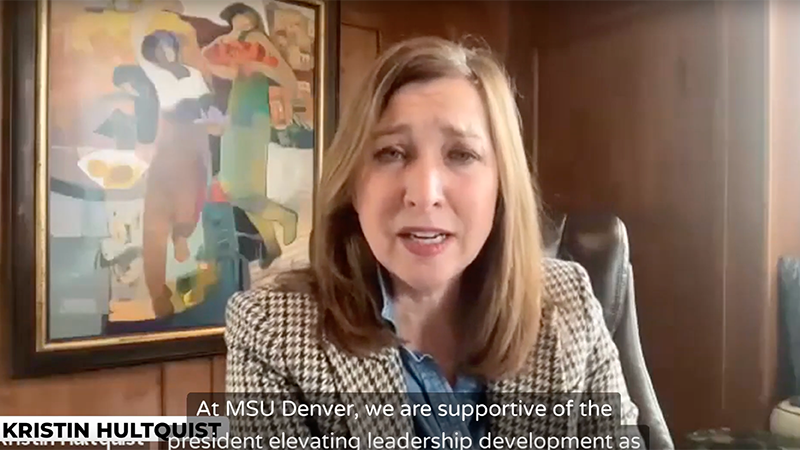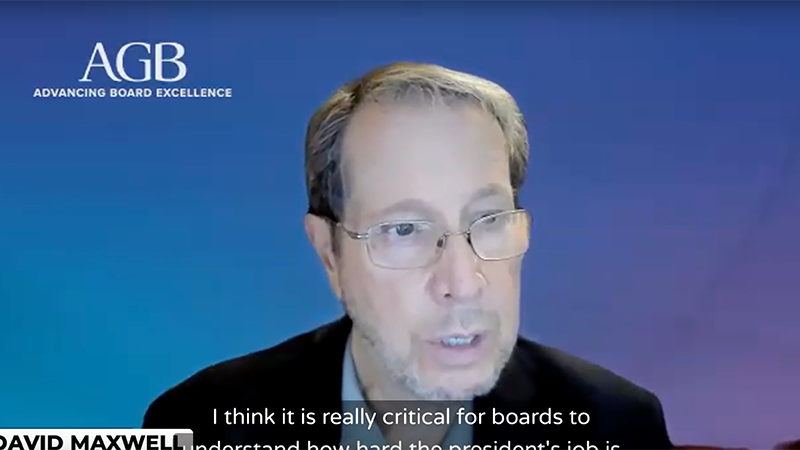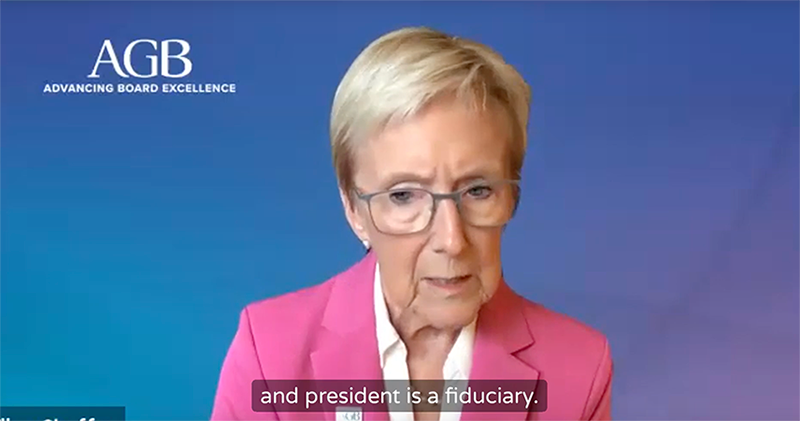
Opinions expressed in AGB blogs are those of the authors and not necessarily those of the institutions that employ them or of AGB.
In November, AGB concluded its webinar series on its Top Strategic Issues for Boards 2024-2025 report. The November webinar discussion focused on several themes from the report, including institutional leadership succession and support. The presentation underscored the critical role of higher education governing boards in hiring, assessing, and supporting an institution’s chief executive. As our panel explained, board members must understand that presidents and chancellors in higher education are facing pressures from many different constituencies. Effective boards must be partners who support the chief executive and protect the institution’s mission and autonomy.
Below are some excerpts from the webinar, along with some of our additional recommendations for higher education governing boards.
Fulfilling Fiduciary Duties
Higher education governing boards have fiduciary requirements mandating that they support their institution’s or system’s mission (known as the duty of care), put the interests of their organization first (duty of loyalty), and ensure that they comply with legal and accreditation requirements (duty of obedience). To meet these fiduciary duties, boards must act with honesty and transparency in developing and supporting their campus’ or system’s leaders.
David K. Wilson, president of Morgan State University and a director on the AGB Board of Directors, explained that the choice of a chief executive is really the most important decision that a higher education board can make, because the CEO’s role is where all three fiduciary duties intersect. Presidents who are effective over the longer term generally succeed best when the boards that hire them have been extremely honest about the state of the institution that they are about to inherit. If the board is not transparent and is sitting on something that they know is a major internal or external challenge, they are setting that chief executive up for a difficult tenure. Boards and presidents need to know that they are the right fits for each other—which requires having genuine conversations before the prospective president signs on the dotted line.
Furthermore, chief executives should consider how to cultivate and prepare the next generation of presidents and chancellors, making sure their cabinet members have the essential skills to carry out their duties and responsibilities. Chief executives have a duty to make sure that they leave their institutions in the best of hands, Wilson added.
Kristin Hultquist, chair of the Board of Trustees at Metropolitan State University of Denver and CEO and founding partner of HCM Strategists, LLC, agreed that higher education boards should be supportive of their chief executives and make leadership development a campuswide priority. Every campus and institution is different, so it is important to cultivate internal talent because it helps organizations manage the challenges in their specific environments. Otherwise, a board would not be exercising its duties of care, loyalty, and obedience.
To achieve these goals, boards should ensure that their organization has a leadership plan and provides regular assessment, coaching, and development opportunities. Board members should support the chief executive in cultivating future leaders at the cabinet level, such as providing opportunities for members of the leadership team to work directly with the board, said Hultquist.
Having the President’s Back
Effective governing boards recognize that in today’s challenging higher education landscape they must be partners with their presidents and chancellors. Board members must understand that their institution, system, or foundation has multiple internal and external constituencies that are pressuring their chief executive. A supportive relationship with the campus leader is necessary to protect the integrity of their institution’s mission and meet their fiduciary obligations.
David Maxwell, a senior consultant and senior fellow at AGB, Grinnell College trustee, and president emeritus of Drake University, emphasized that boards need to understand how hard a president’s or chancellor’s job is. A chief executive is subjected to demands from the faculty, students, staff, the community, and so forth. It has become increasingly challenging for the board, the president, and the faculty leadership in a shared governance paradigm to make decisions that are consistent with the institution’s mission and strategic vision, but to fulfill their fiduciary duties boards must be supportive of the president.
The board chair, especially, needs to create a safe space for the president or chancellor to come to them when they need to make difficult decisions and discuss options—without the chair thinking that the chief executive does not know how to do their job. A president should be able to take advantage of the chair’s perspective as a sounding board, said Maxwell.
Conclusion
Ellen Chaffee, a senior consultant and senior fellow at AGB, observed that every board member and chief executive has fiduciary responsibilities for institutional leadership succession and support. Supporting an institution’s mission is not a “check the box” exercise—it involves more than assembling good people who care about an institution. Leadership succession and support within an institution or foundation involves discussion and planning to develop a deep understanding and trusting relationship among the board, chief executive, and other campus leaders.
Chaffee encouraged boards, presidents, cabinet members, board professionals, and other higher education leaders who are looking for more information to explore AGB’s biennial report Top Strategic Issues for Boards 2024-2025. This report is based on input from AGB members and identifies critical, contemporary topics, questions, and opportunities for institutions, systems, and foundations, including leadership succession and support.
Ellen Chaffee is a senior consultant and senior fellow at AGB.
Kristin Hultquist is chair of the Board of Trustees at Metropolitan State University of Denver and CEO and founding partner of HCM Strategists, LLC.
David Maxwell is a senior consultant and senior fellow at AGB, trustee of Grinnell College, and president emeritus of Drake University.
David K. Wilson is president of Morgan State University and a director on the AGB Board of Directors.
RELATED RESOURCES

Blog Post
Be Prepared

Reports and Statements
AGB Board of Directors’ Statement on the Fiduciary Duties of Governing Board Members







